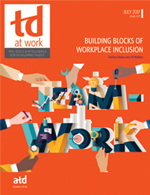TD Magazine Article
Organizations Win When Everyone Is Heard
Your organization can be diverse yet not inclusive.
Sat Jul 01 2017

Your organization can be diverse yet not inclusive, explain the authors of "Building Blocks of Workplace Inclusion," the July 2017 issue of TD at Work. To get to the latter, an organization needs to create a space where "employees are respected and sincerely involved in a way that translates into value for the organization."
Evelina Silveira and Jill Walters provide a few considerations to becoming more inclusive.
Accommodation. This relates not only to physical disability, but also accommodation around mental health, religion, work-life balance, and hidden disability. For example, to do their best work, some sandwich generation women might need a flexible schedule to care for both aging parents and children.
Mentoring. Mentorship benefits both the mentor and mentee, explain the authors, referencing Sun Microsystems research pointing to salary increases for both. A successful mentoring program develops and nurtures community partnerships and associations.
Workplace inclusion and equity committee. Although these committees are called by different names in different organizations, they help senior leaders understand the complex nuances associated with diversity and inclusion, and create opportunities for input from a broad range of perspectives. Drawing up terms of reference (meeting frequency, communication forms, the group's mandate) and selecting a strong leader are integral to an effective committee.
These tips were adapted from the July 2017 issue of TD at Work.
